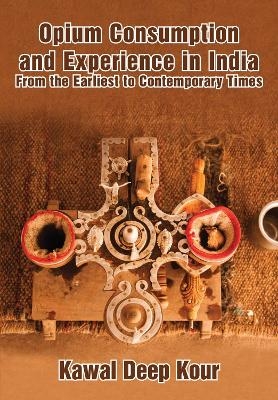
Opium Consumption and Experience in India
From the Earliest to Contemporary Times
Seiten
2024
Academica Press (Verlag)
978-1-68053-616-4 (ISBN)
Academica Press (Verlag)
978-1-68053-616-4 (ISBN)
Offers a ‘cultural biography’ of opium in the subcontinent. The book spans the Raj and India after independence. It illuminates how opium came to occupy a central place in the ‘cultures of consumption’ and also in the socio-economic and political life of a people.
Opium Consumption and Experience in India offers a "cultural biography" of opium in the subcontinent. It spans the Raj and India after independence. The book examines the "social lives" of opium in India, beginning as a commodity in the sixteenth century to its social transformation and singularization in the eighteenth century, and its decline from the mid-nineteenth century to obsolescence in the twentieth century to new "paths and diversions" in our own times. The book attempts to illuminate how opium came to occupy a central place in the "cultures of consumption" and also in the socio-economic and political life of a people. How did opium become embedded in a social ethos where it not only served as a social lubricant but soon morphed into a narco-identity for the people of India. The identification of India as a land of "great opium eaters" spawned the propaganda of a "civilizing mission" that ushered in a new era of material exploitation and political domination. This had a significant impact on the development and regulation of opium and its use.
Opium Consumption and Experience in India offers a "cultural biography" of opium in the subcontinent. It spans the Raj and India after independence. The book examines the "social lives" of opium in India, beginning as a commodity in the sixteenth century to its social transformation and singularization in the eighteenth century, and its decline from the mid-nineteenth century to obsolescence in the twentieth century to new "paths and diversions" in our own times. The book attempts to illuminate how opium came to occupy a central place in the "cultures of consumption" and also in the socio-economic and political life of a people. How did opium become embedded in a social ethos where it not only served as a social lubricant but soon morphed into a narco-identity for the people of India. The identification of India as a land of "great opium eaters" spawned the propaganda of a "civilizing mission" that ushered in a new era of material exploitation and political domination. This had a significant impact on the development and regulation of opium and its use.
Kawal Deep Kour holds a Ph.D. from the Indian Institute of Technology, Guwahati. A drug abuse prevention specialist, she is currently Director of the South Asian Drugs and Addictions Research Council and a former board member of the International Society for the Study of Drug Policy (ISSDP). She is the author of History of Intoxication: Opium in Assam, 1800-1959 and many other publications.
| Erscheinungsdatum | 16.09.2023 |
|---|---|
| Verlagsort | Bethesda |
| Sprache | englisch |
| Maße | 152 x 229 mm |
| Gewicht | 272 g |
| Themenwelt | Geisteswissenschaften ► Geschichte ► Regional- / Ländergeschichte |
| Sozialwissenschaften ► Soziologie | |
| ISBN-10 | 1-68053-616-8 / 1680536168 |
| ISBN-13 | 978-1-68053-616-4 / 9781680536164 |
| Zustand | Neuware |
| Informationen gemäß Produktsicherheitsverordnung (GPSR) | |
| Haben Sie eine Frage zum Produkt? |


